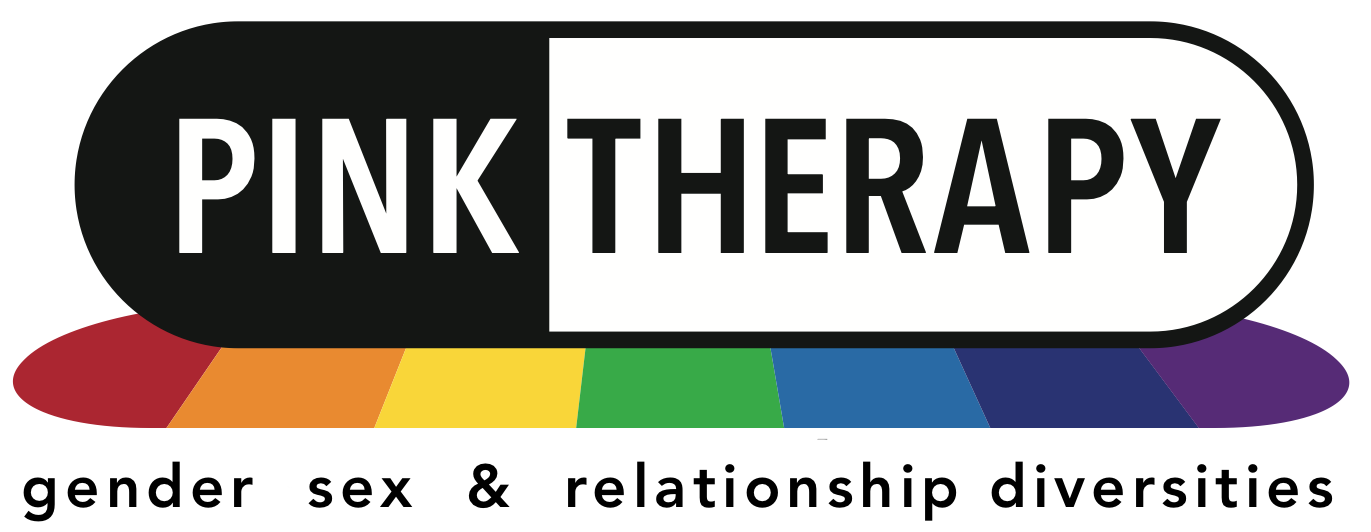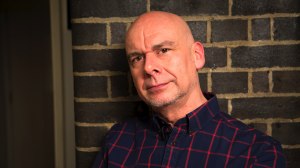A Pink Therapy Summer School in London, July 8-12, 2013
Editor’s note: this is a guest post from André Helman, MD; a relational psychotherapist from Paris.
Pink Therapy is an independent therapy and training institution devoted to LGBT people and to gender and sexual diversity. Located in London, it was created by Dominic Davies, a psychotherapist and sex therapist, who runs it together with a team of fifteen or so therapists and trainers.
I was lucky enough to take part in an international summer school about Gender and Sexual Diversity Therapy (GSDT). Exploring this concept, which was brand new to me, as well as its implications was an opportunity for dramatic breakthroughs and broadening of my field of thought. That is the experience I wish to evoke in this paper. It is not an in-depth reflection about GSD (many books were published about it, and many are still to be written), only a brief report where the author’s subjectivity is freely invited.
The GSD concept
Gender and Sexual Diversity (GSD) and Gender and Sexual Diversity Therapy (GSDT) concepts were elaborated through the recent years by Dominic Davies and his colleagues. The initial book, Pink Therapy, which gave its name to the institute, was directed by Dominic Davies and Charles Neal, and first published in 1996. It dealt with affirmative therapy for gay men. Progressively, the wording evolved: gay affirmative therapy turned into gay and lesbian affirmative therapy, and then sexual minority therapy, until the current term GSDT. Indeed, it appeared that the LGBT concept – even when adding an I for intersex or a Q for queer – would not allow to include all patients who were addressed by this therapeutic approach. For instance, this term excludes asexuals, kinksters, swingers, polyamorous, non-monogamous, flexible heterosexuals, fetishists, “objectum sexuals” (people who experience a romantic attraction to an object), the approach would not be consistent if it added an exclusion to those it intends to stand together with.
Every person related to any aspect of GSD suffers a social oppression, with different degrees and specific forms, which induces an internalized oppression, as an identification to the “norm”, and a counter-oppression, as a reaction. For example, the fight against misogynous oppression – wrongly named sexist – generated diverse types of counter-oppression, among which misandry is a major one. The common oppression suffered by all GSD persons can be resumed with five injunctions: meet someone of the other sex, get married, have children stay together for your whole life, be faithful… But “the award for conformity is that everybody loves you… but you”. Within the LGBT(IQ…) “community itself, discrimination and difference rejection are common practice. To be oppressed does not prevent you from being an oppressor.
Group dynamics
Our group consisted of twelve persons, originating from 11 countries: Benin (West Africa), Catalonia, Denmark, Finland, Ireland, Italy, Poland, Scotland, USA and France – and representing many diversities : gays, lesbians, bisexuals, asexuals, flexible heterosexuals, transmen… All of them where psychotherapists, either active or about to complete their training, all of them were very motivated and involved in the process. The course was presented by the same pair every morning (Pamela Gawler-Wright and Olivier Cormier-Otaño), while a different trainer intervened every afternoon, according to the topic.
As soon as the group met first for the time, the leading pair, tactfully and lightly, installed a climate of confidence, mutual respect and freedom of speech which greatly contributed to the quality and profoundness of our sharing throughout the course. Their interventions were rich with information and experiences. Together with the proposed exercises they both inflamed me and confronted me with my limits, my questioning, my fears. Each afternoon trainer, in their own special way, contributed to these dynamics.
Each participant was invited to share in how they experienced the exercises as well as their own personal and professional experience, as related to the discussed topics. They all did so with a great sincerity, which allowed me to discover some aspects of GSD, I knew nothing about, to be confronted to my own stereotypes and prejudices, and, eventually, to dramatically change my viewpoint about some of them.
The course main lines
Many issues were developed, discussed and deepened through practical exercises. Below, I mention the main ones and what I experienced when tackling them.
Stereotypes and prejudices
As with everybody, our patients carry all kinds of stereotypes and prejudices, which partly contribute to generating and/or maintaining their unwellness. Therapist do too! This contributes to narrow our vision of our patients, our capacity to accept them fully as they are and, consequently, the quality of our support. Without taking the expression “The cobbler’s children go barefoot” at face value, we all should continue to explore and challenge our own stereotypes and prejudices, aiming at getting free from them. As far as I am concerned, this course greatly helped me in this respect. Work is still in progress…
Is my therapist GSD?
Choosing a therapist one considers as heterosexual or, on the contrary, as identically oriented is not neutral. It’s worth exploring what such a choice implies. For instance:
- The fear a GSD person may experience about confiding in a heterosexual therapist may come from their own heterophobia: to believe a heterosexual therapist is deductively unable to support a GSD patient; conversely, the belief that choosing a same GSD oriented therapist is a sufficient condition is limiting too: it cannot be the only criterion for a successful therapy.
- As regards a same oriented therapist, there is a risk of collusion (I understand them as I experienced the same thing as they do) or identification (I experience the same thing as they do so what they say relates to me personally).
- To say or not to say whether I’m GSD: it was very helpful for me to participate in a discussion about this issue. Is it right to answer the patient’s question “Are you gay?” and how to do it?
Lesbianism and lesbophobia
Through “life stories” of Anglo-Saxon lesbian celebrities, illustrated by animated and musical presentations, Pamela Gawler-Wright lightly introduced us to the yet awful word of social persecutions which lesbians experienced since some of them started to claim their visibility and right to be themselves.
Coming out
Half a day was devoted to the coming-out issues. In particular, the following topics were addressed:
-
Coming out is multiple: one experiences as many coming outs as there are situations and persons one has to face throughout one’s life; thus, it’s repeated many times, in a different way every time.
-
As the consequences of coming out are unknown, it necessarily makes the person feel unsafe.
- It’s hard to resist the belief “It should be known” (transparency as a moral value).
Shame, vulnerability and internalized oppression
Another half-day permitted to develop and deepen this issue, through exercises in which participants got very involved. As far as I am concerned, it was overwhelming and it taught me a lot. In particular, it presented me with an opportunity of experiencing a real breakthrough about the self-maintained process of superego injunctions.
I feel internalized oppression is a core issue for many of our patients, specially – but not only – our GSD patients. It’s likely to be one the most widely shared psychological processes. Even white heterosexual men cannot escape it (at least not all of them…): many of them have internalized the oppression of sexual performance obligation or that of aggressive machismo as inseparable from their manhood (a young male, smart, open-minded patient recently told me “if I climb stairs behind a woman – as any gallant man should do – and she wears a miniskirt, what will she think about me?”)
For many GSD persons, social oppression is very deep as it is rooted in gender difference. Internalizing it induces the shame of being oneself as well as radical judgements about one’s own desires, thoughts and acts. This shame causes vulnerability and hypervigilance regarding anyone or anything that could question this aspect of the person’s identity. But to be vulnerable does not mean to be weak: on the contrary, accepting one’s vulnerability is a major strength which contributes to coming out of shame and of internalized oppression.
In any case, the psyche authority that judges and pronounces irrevocable condemnations – whether you call it cruel superego or “top dogs” – plays a major part in maintaining shame, especially by justifying it endlessly. If we consider it as a major target of the therapeutic process, it can only benefit to our patients.
Asexuality
Discovering asexuality was one of the highlights of the course for me, particularly as we could take advantage with direct testimonies. Furthermore, Olivier Cormier-Otaño presented us with an enthralling study he conducted via a questionnaire that reached 310 persons considering themselves as asexual. In our hypersexual society, asexuality stands as a very strange, incomprehensible phenomenon. For us, psychotherapists, it shocks our “knowledge” about sexuality and its issues… where it finds no place. It’s our responsibility to give it its right place if we want to be able to support asexual persons along their way to feel at peace with themselves and get integrated in their environment.
Transsexuality
Here again, direct testimonies were a major contribution to the course. I had already read books and articles on this topic, but coming to meet persons who experience transsexuality is irreplaceable.
We heard a presentation about the activity of the Tavistock Clinic service dealing with children and teenagers who question their gender – the only service of this kind in the UK. It threw light on how to welcome and answer their questioning, both on a human and medical level.
“Help me not be gay!”
Conversion therapies, even though in loose momentum, still exist in Anglo-Saxon countries – maybe in France, as well, I don’t know. Without going so far, all of us may have to face a person whose request is to help them stop experiencing feelings and emotions related to GSD. How should we meet this request? How can we support them in their quest for an inner harmony, without letting ourselves being carried away by a “pro-GSD” ideology?
Behind such a request, as behind any request concerning identity, there are beliefs, grounded on stereotypes, and which appear to the person as truths, as certitudes. The suggested approach aims at helping the person to see truths as beliefs and to realise that beliefs are not the truth (my simplification…).
As a provisional conclusion
A word imposes itself to me after this experience: empowerment. I could say, feeling confident and deeply free, because of the recognition of my responsibility towards GD persons and my capacity to face it.
I never so clearly realised the pressing urge to acknowledge, accept and welcome human diversity, whatever its form and expression, as well as to challenge the stereotypes and prejudices it inevitably reveals to me.
The GSD concept is just emerging. It’s hardly starting to contribute redesigning the outlines of our ‘community’ and to influence the way we look at our patients, and perhaps at our practice. Meeting GSD persons who embody some GSD aspects I didn’t know, or about which I had rather bulky prejudices, helped me a tremendous lot in accepting them better, hence feeling better with myself and more open to my patients.
André Helman, MD; a relational psychotherapist from Paris.
 I am grateful that to everyone who played a part in lobbying the Board with their views, research and concerns. I think this has been immensely helpful in helping the Board decide that these protections are needed.
I am grateful that to everyone who played a part in lobbying the Board with their views, research and concerns. I think this has been immensely helpful in helping the Board decide that these protections are needed.

